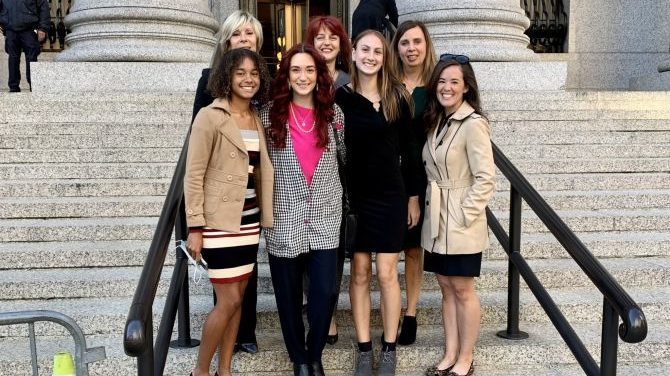A federal appeals court announced Feb. 13 it will rehear a lawsuit filed by female athletes who say they were deprived of honors and opportunities in athletic competitions because biological males who identified as female were allowed to compete with them.
The 2nd U.S. Circuit Court of Appeals’ decision will allow a legal challenge to Connecticut’s Interscholastic Athletic Conference policy that allows males who identify as female to compete in girls’ athletic events. It comes two months after a three-judge panel for the appellate court ruled against the girls, who are now adults.
The suit was filed by four girls who competed in high school track and field contests in Connecticut. In suing the Connecticut Association of Schools, they claimed they missed out on certain achievements, such as championship titles and opportunities to advance to next-level competition and records, which could play a role in scholarships.
Alliance Defending Freedom (ADF), which represented the girls, had not requested the court to rehear the case before the court making the decision. However, the lawyers expressed optimism that the full court has chosen to rehear it.
“Selina, Chelsea, Alanna, and Ashley — like all female athletes — deserve access to fair competition,” ADF Senior Counsel Christiana Kiefer said in a statement.
“We’re pleased the 2nd Circuit has decided to rehear this important case, and we urge the court to protect women’s athletic opportunities,” Kiefer added. “Eighteen states have enacted laws that protect women and girls from having to compete against males, and polls show that a majority of Americans agree that the competition is no longer fair when males are permitted to compete in women’s sports. Every woman deserves the respect and dignity that comes with having an equal opportunity to excel and win in athletics, and ADF remains committed to protecting the future of women’s sports.”
The lawsuit cites specific examples in which it claims the female athletes missed out on opportunities. Over three years, the lawsuit notes that two biological males who identified as girls won 15 state track championship titles, secured 85 spots in next-level competition, and broke 17 records, which would have otherwise gone to biologically female athletes. Chelsea Mitchell, who is represented in the lawsuit, placed second in four of those state championships and placed behind a biological male 20 times.
In the previous ruling, the three-judge panel ruled against the girls, saying they “had the opportunity to compete for state titles in different events” and “on numerous occasions, plaintiffs were indeed ‘champions,’ even sometimes when competing with [the two biologically male student athletes].”
The ruling added that “the mere fact that athletic experience may be a significant factor for prospective employers in their hiring decisions does not show that plaintiffs’ future employment opportunities are harmed by the current records.”
Kiefer told CNA that throughout the country, she is “certainly seeing a trend of activist organizations and athletic associations creating new rules that allow males to compete in women’s sports.” She said this case “will certainly set binding precedent” and that the court’s decision to “rehear this very important precedent-setting case” is “a very hopeful sign.”
The Connecticut Association of Schools did not respond to a request for comment by the time of publication.
The 2nd U.S. Circuit Court of Appeals’ jurisdiction fully covers three states: Connecticut, New York, and Vermont.

